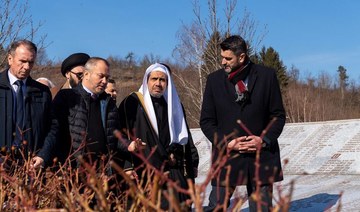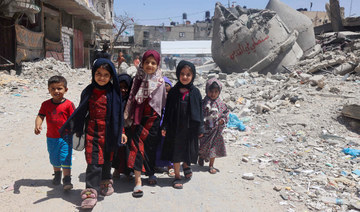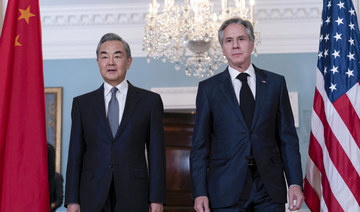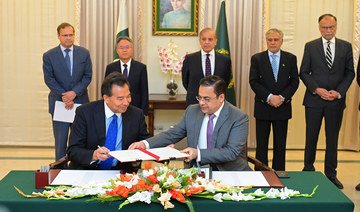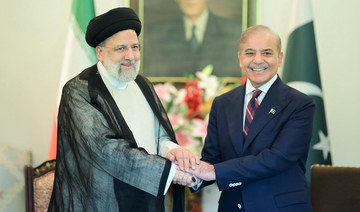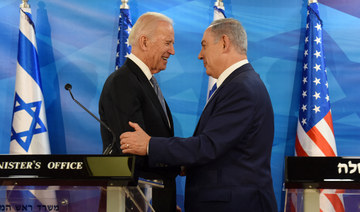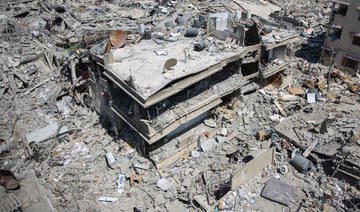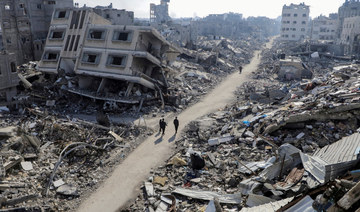SREBRENICA: Bosnian Muslims began marking the 25th anniversary of the Srebrenica massacre on Saturday, the worst atrocity on European soil since World War II, with the memorial ceremony sharply reduced as a result of the coronavirus pandemic.
Proceedings got underway in the morning with many mourners braving the tighter restrictions put in place to stem the spread of COVID-19.
At 1100 GMT, a ceremony laying to rest the remains of nine victims identified over the past year began at the memorial cemetery in Potocari, a village just outside Srebrenica that served as the base for the UN protection force during the conflict.
On July 11, 1995, after capturing the ill-fated town, Serb forces killed more than 8,000 Muslim men and boys in Srebrenica in a few days.
Sehad Hasanovic, 27, has a two-year-old daughter — the same age he was when he lost his father in the violence.
“It’s difficult when you see someone calling their father and you don’t have one,” Hasanovic said in tears, not dissuaded from attending the commemorations in spite of the virus.
His father, Semso, “left to go into the forest and never returned. Only a few bones have been found,” said Hasanovic.
Like his brother Sefik and father Sevko, Semso was killed when Bosnian Serb troops led by Ratko Mladic entered the Srebrenica enclave before systematically massacring Bosnian men and adolescents.
“The husbands of my four sisters were killed,” said Ifeta Hasanovic, 48, whose husband Hasib was one of the nine victims whose remains have been identified since July 2019.
“My brother was killed, so was his son. My mother-in-law lost another son as well as her husband.”
The episode — labelled as genocide by two international courts — came at the end of a 1992-1995 war between Bosnia’s Croats, Muslims and Serbs that claimed some 100,000 lives.
So far, the remains of nearly 6,900 victims have been found and identified from more than 80 mass graves.
Bosnian Serb wartime military chief general Ratko Mladic, still revered as a hero by many Serbs, was sentenced to life in prison by a UN court in 2017 over war crimes including the Srebrenica genocide. He is awaiting the decision on his appeal.
Radovan Karadzic, a Bosnian Serb wartime political leader, was also sentenced to life in prison in The Hague.
The Srebrenica massacre is the only episode of the Bosnian conflict to be described as genocide by the international community.
And while for Bosnian Muslims recognizing the scale of the atrocity is a necessity for lasting peace, for most Serbs — leaders and laypeople in both Bosnia and Serbia — the use of the word genocide remains unacceptable.
In the run-up to the anniversary, Serbian President Aleksandar Vucic described Srebrenica as “something that we should not and cannot be proud of,” but he has never publicly uttered the word “genocide.”
Several thousand Serbs and Muslims live side by side in impoverished Srebrenica, a town in eastern Bosnia with just a few shops in its center.
On Friday, the town’s Serbian mayor Mladen Grujicic — who was elected in 2016 after a campaign based on genocide denial — said that “there is new evidence every day that denies the current presentation of everything that has happened.”
Bosnian Serb political leader Milorad Dodik has also described the massacre as a “myth.”
But on Friday, the Muslim member of Bosnia’s joint presidency, Sefik Dzaferovic, said: “We will tirelessly insist on the truth, on justice and on the need to try all those who have committed this crime.”
“We will fight against those who deny the genocide and glorify its perpetrators,” he said at the memorial center where he attended a collective prayer.
In order to avoid large crowds on Saturday, organizers have invited people to visit the memorial center over the whole month of July.
A number of different exhibitions are on display, including paintings by Bosnian artist Safet Zec.
Another installation, entitled “Why Aren’t You Here?” by US-Bosnian artist Aida Sehovic, comprises more than 8,000 cups of coffee spread out on the cemetery’s lawn.
“We still haven’t answered the question why they are no longer here,” she told AFP.
“How could this have happened in the heart of Europe, that people were killed in such a terrible way in a UN protected area? Not to mention the fact that the genocide is still being denied.”
Bosnia Muslims mourn their dead 25 years after Srebrenica massacre
https://arab.news/mfzsm
Bosnia Muslims mourn their dead 25 years after Srebrenica massacre
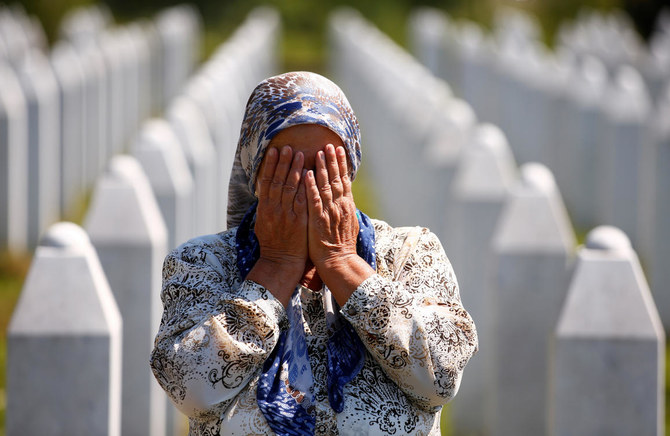
- At 1100 GMT, a ceremony laying to rest the remains of nine victims identified over the past year began at the memorial cemetery in Potocari
- On July 11, 1995, after capturing the ill-fated town, Serb forces killed more than 8,000 Muslim men and boys in Srebrenica in a few days
Ending Mideast conflict not a priority for most Americans: Survey
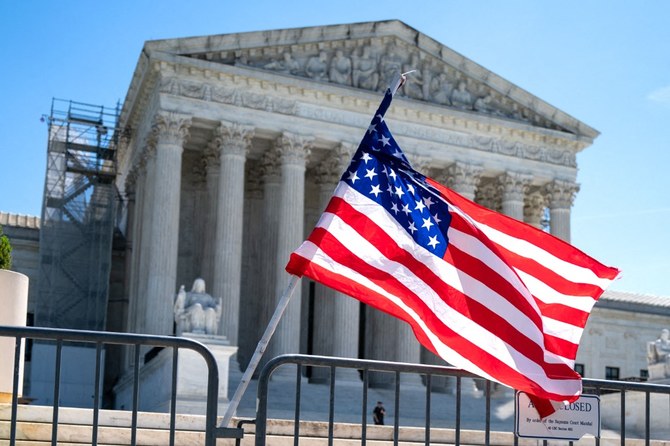
- 83% of respondents say Biden should focus on domestic policy
- 31% say supporting Israel should be given no priority
Chicago: A majority of Americans do not see the Israeli-Palestinian conflict as a foreign policy priority, according to two new concurrent surveys by the Pew Research Center.
Americans identified as their top four of 22 foreign policy priorities protecting the country from terrorism (71 percent), reducing illegal drugs (64 percent), preventing the spread of weapons of mass destruction (63 percent) and maintaining a military advantage over foreign powers.
Finding a solution to the Israeli-Palestinian conflict drew 29 percent, ranking only 14th among the 22 priorities.
The question of “supporting Israel” ranked even lower at 20th with 22 percent, with 31 percent opposing that support.
“Overall, a majority of Americans say that all 22 long-range foreign policy goals we asked about should be given at least some priority. Still, about three in 10 say supporting Israel, promoting democracy in other nations (28 percent) and supporting Ukraine (27 percent) should be given no priority,” Jacob Poushter, Pew associate director of research, told Arab News.
“Even with these priorities, 83 percent of Americans say it is more important for President Joe Biden to focus on domestic policy, compared with 14 percent who say he should focus on foreign policy.
“In 2019, 74 percent wanted then-President Donald Trump to focus on domestic policy, and 23 percent said he should focus on foreign policy.”
Pew researchers said finding a solution to the Israeli-Palestinian conflict was previously “a priority that saw no partisan difference at all” in a 2018 survey.
But the new surveys show a “partisan gap” emerging, with twice as many Democrats (36 percent) today than in 2018 calling the conflict “a priority,” while the share of Republicans (20 percent) has remained constant.
Twenty-nine percent of Americans say they have a great deal or fair amount of confidence in the UN’s ability to provide effective humanitarian aid to Gaza. Fifty-one percent do not have confidence and 19 percent are unsure.
Only 15 percent of Americans say they have confidence in the UN’s ability to enforce a ceasefire between Israel and Hamas. Sixty-seven percent have no confidence and 17 percent are unsure.
A recent Pew survey found that only 12 percent of Americans believe that lasting peace between Israelis and Palestinians is at least somewhat likely.
Blinken due in China seeking pressure but also stability
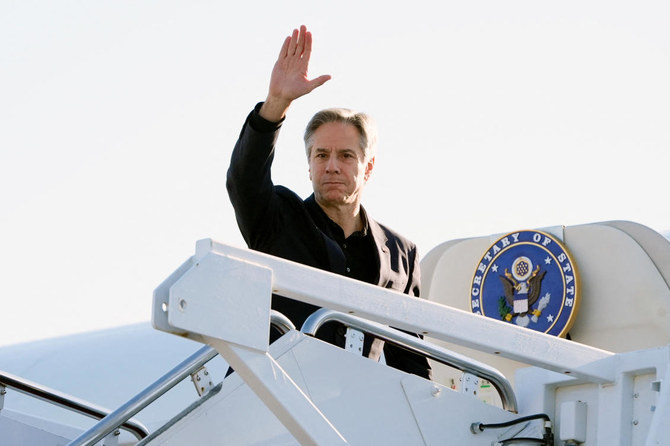
Shanghai: US Secretary of State Antony Blinken was due in China on Wednesday, as the United States ramps up pressure on its rival over its support for Russia while also seeking to manage tensions with Beijing.
The US diplomat will meet China's top brass on Friday in Beijing, where he is also expected to plead for restraint as Taiwan inaugurates a new leader, and to raise US concerns on Chinese trade practices -- a vital issue for President Joe Biden in an election year.
But Blinken is also seeking to stabilise ties, with tensions between the world's two largest economies palpably easing since his last visit in June.
At the time, he was the highest-ranking US official to visit China in five years, and the trip was followed by a meeting between the countries' presidents in November.
At that summit in California, Chinese President Xi Jinping agreed to a US wish list including restoring contact between militaries and cracking down on precursor chemicals to fentanyl, the powerful painkiller behind an addiction epidemic in the United States.
Blinken will start his visit on Wednesday in Shanghai.
While in the city, he will meet students and business leaders in what an aide called a bid to highlight warm ties between the American and Chinese peoples.
The friendly side trip -- the first visit by a US secretary of state to the bustling metropolis since Hillary Clinton in 2010 -- would have been unthinkable until recently, with hawks on both sides previously speaking of a new Cold War between the two powers.
Treasury Secretary Janet Yellen similarly toured the manufacturing hub of Guangzhou before visiting Beijing earlier this month.
A senior US official previewing Blinken's trip said that the United States and China were at a "different place than we were a year ago, when the bilateral relationship was at an historic low point".
"We also believe, and we have also clearly demonstrated, that responsibly managing competition does not mean we will pull back from measures to protect US national interests," he said.
The Biden administration's eagerness to engage China stands in stark contrast to its efforts to isolate Russia since its invasion of Ukraine in February 2022.
After initially being pleased that Beijing has not directly supplied weapons to Russia, the United States in recent weeks has accused China of lavishing industrial material and technology on Moscow.
Washington has encouraged European leaders, including German Chancellor Olaf Scholz, who recently visited Beijing, to stand firm on China not backing Russia, believing that it wants stable ties with the West as it focuses on addressing economic headwinds at home.
"If China purports on the one hand to want good relations with Europe and other countries, it can't on the other hand be fuelling what is the biggest threat to European security since the end of the Cold War," Blinken said Friday after Group of Seven talks in Capri, Italy.
The Biden administration has trumpeted the agreement with Xi on fentanyl as a success.
A State Department official said that since the November summit, China appears to have taken its first law enforcement measures on the matter since 2017.
Blinken will ask for further implementation, the official said.
"More regular PRC law enforcement action against PRC-based chemical companies and pill press manufacturers involved in illicit fentanyl supply chains would send a strong signal of China's commitment to address this issue," the official said, referring to the People's Republic of China.
One source of friction between the two countries is new legislation that cleared the US Congress on Tuesday -- and which Biden intends to sign -- requiring the wildly popular social media app TikTok to be divested from its Chinese parent company ByteDance, or be shut out of the American market.
Biden faces a rematch in November against former president Donald Trump, who has vowed a more confrontational approach against China.
Yun Sun, a senior fellow at the Washington-based Stimson Center, said that China's leaders, eager to focus on their economy, were in a wait-and-see mode ahead of the US election.
"The Chinese understand that the Biden administration is unlikely to deliver any good news on trade because that simply does not support the election agenda," she said.
For Chinese leaders this year, "their priority is to keep the relationship stable".
"Until there is clarity on who the next administration will be, I don't think they see a better strategy," she said.
Arrests follow barricades and encampments as US college students nationwide protest Gaza war
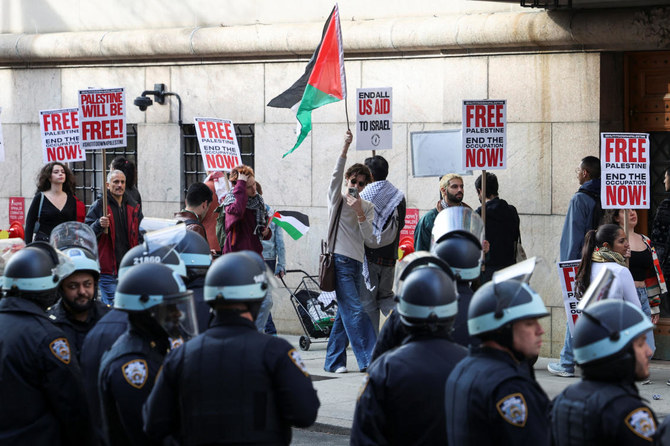
- More than 100 pro-Palestinian demonstrators who had camped out on Columbia University’s upper Manhattan campus were arrested last week
Standoffs between pro-Palestinian student protesters and universities grew increasingly tense on both coasts Wednesday as hundreds encamped at Columbia University faced a deadline from the administration to clear out while dozens remained barricaded inside two buildings on a Northern California college campus.
Both are part of intensifying demonstrations over Israel’s war with Hamas by university students across the country, leading to dozens of arrests on charges of trespassing or disorderly conduct.
Columbia’s President Minouche Shafik in a statement Wednesday set a midnight deadline to reach an agreement with students to clear the encampment, or “we will consider alternative options.”
That deadline passed without news of an agreement. Videos show some protesters taking down their tents while others doubled down in speeches. The heightened tension arrived the night before US House Speaker Mike Johnson’s trip to Columbia to visit with Jewish students and address antisemitism on college campuses.
Across the country, protesters at California State Polytechnic University, Humboldt, started using furniture, tents, chains and zip ties to block the building’s entrances Monday evening. The defiance was less expected in the conservative region of California, some 300 miles (480 kilometers) north of San Francisco.
“We are not afraid of you!” the protesters chanted before officers in riot gear pushed into them at the building’s entrance, video shows. Student Peyton McKinzie said she was walking on campus Monday when she saw police grabbing one woman by the hair, and another student having their head bandaged for an injury.
“I think a lot of students are in shock about it,” she told The Associated Press.
Three students have been arrested, according to a statement from Cal Poly Humboldt, which shutdown the campus until Wednesday. An unknown number of students had occupied a second campus building Tuesday.
The upwelling of demonstrations has left universities struggling to balance campus safety with free speech rights. Many long tolerated the protests, which largely demanded that schools condemn Israel’s assault on Gaza and divest from companies that sell weapons to Israel.
Now, universities are doling out more heavy-handed discipline, citing safety concerns as some Jewish students say criticism of Israel has veered into antisemitism.
Protests had been bubbling for months but kicked into a higher gear after more than 100 pro-Palestinian demonstrators who had camped out on Columbia’s upper Manhattan campus were arrested Thursday.
By late Monday at New York University, police said 133 protesters were taken into custody and all had been released with summonses to appear in court on disorderly conduct charges.
In Connecticut, police arrested 60 protesters — including 47 students — at Yale, after they refused to leave an encampment on a plaza at the center of campus.
Yale President Peter Salovey said protesters had declined an offer to end the demonstration and meet with trustees. After several warnings, school officials determined “the situation was no longer safe,” so police cleared the encampment and made arrests.
In the Midwest on Tuesday, a demonstration at the center of the University of Michigan campus had grown to nearly 40 tents, and nine anti-war protesters at the University of Minnesota were arrested after police took down an encampment in front of the library. Hundreds rallied to the Minnesota campus in the afternoon to demand their release.
Harvard University in Massachusetts has tried to stay a step ahead of protests by locking most gates into its famed Harvard Yard and limiting access to those with school identification. The school has also posted signs that warn against setting up tents or tables on campus without permission.
Literature Ph.D. student Christian Deleon said he understood why the Harvard administration may be trying to avoid protests but said there still has to be a place for students to express what they think.
“We should all be able to use these kinds of spaces to protest, to make our voices heard,” he said.
Ben Wizner, a lawyer with the American Civil Liberties Union, said college leaders face extremely tough decisions because they have a responsibility to ensure people can express their views, even when others find them offensive, while protecting students from threats and intimidation.
The New York Civil Liberties Union cautioned universities against being too quick to call in law enforcement in a statement Tuesday.
“Officials should not conflate criticism of Israel with antisemitism or use hate incidents as a pretext to silence political views they oppose,” said Donna Lieberman, the group’s executive director.
Leo Auerbach, a student at the University of Michigan, said the differing stances on the war hadn’t led to his feeling unsafe on campus but he has been fearful of the “hateful rhetoric and antisemitic sentiment being echoed.”
“If we’re trying to create an inclusive community on campus, there needs to be constructive dialogue between groups,” Auerbach said. “And right now, there’s no dialogue that is occurring.”
At the Massachusetts Institute of Technology, physics senior Hannah Didehbani said protesters were inspired by those at Columbia.
“Right now there are several professors on campus who are getting direct research funding from Israel’s ministry of defense,” she said. “We’ve been calling for MIT to cut those research ties.”
Protesters at the University of California, Berkeley, which had an encampment of about 30 tents Tuesday, were also inspired by Columbia’s demonstrators, “who we consider to be the heart of the student movement,” said law student Malak Afaneh.
Campus protests began after Hamas’ deadly attack on southern Israel, when militants killed about 1,200 people, most of them civilians, and took roughly 250 hostages. During the ensuing war, Israel has killed more than 34,000 Palestinians in the Gaza Strip, according to the local health ministry, which doesn’t distinguish between combatants and noncombatants but says at least two-thirds of the dead are children and women.
Argentina seeks arrest of Iran minister, recently in Pakistan, over 1994 Jewish center bombing
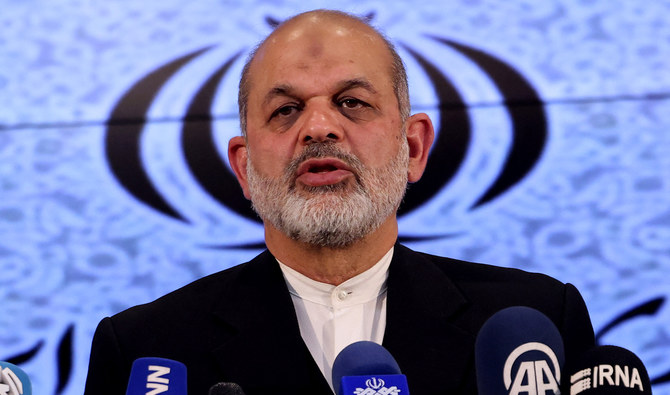
- Argentina contacted Interpol and asked Pakistani, Sri Lankan governments to arrest Iran’s interior minister
- The 1994 bombing has never been claimed or solved, but Argentina has suspected Iran to be behind the attack
BUENOS AIRES: Argentina has asked Interpol to arrest Iran’s interior minister over the 1994 bombing of a Jewish community center in Buenos Aires that killed 85 people, the foreign ministry said Tuesday.
That minister, Ahmad Vahidi, is part of an Iranian delegation visiting Pakistan and Sri Lanka, and Interpol has issued a red alert seeking his arrest at the request of Argentina, the ministry said in a statement.
Argentina has also asked those two governments to arrest Vahidi, it added.
On April 12 a court in Argentina placed blame on Iran for the 1994 attack against the AMIA Jewish community center in Buenos Aires and for a bombing two years earlier against the Israeli embassy, which killed 29 people.
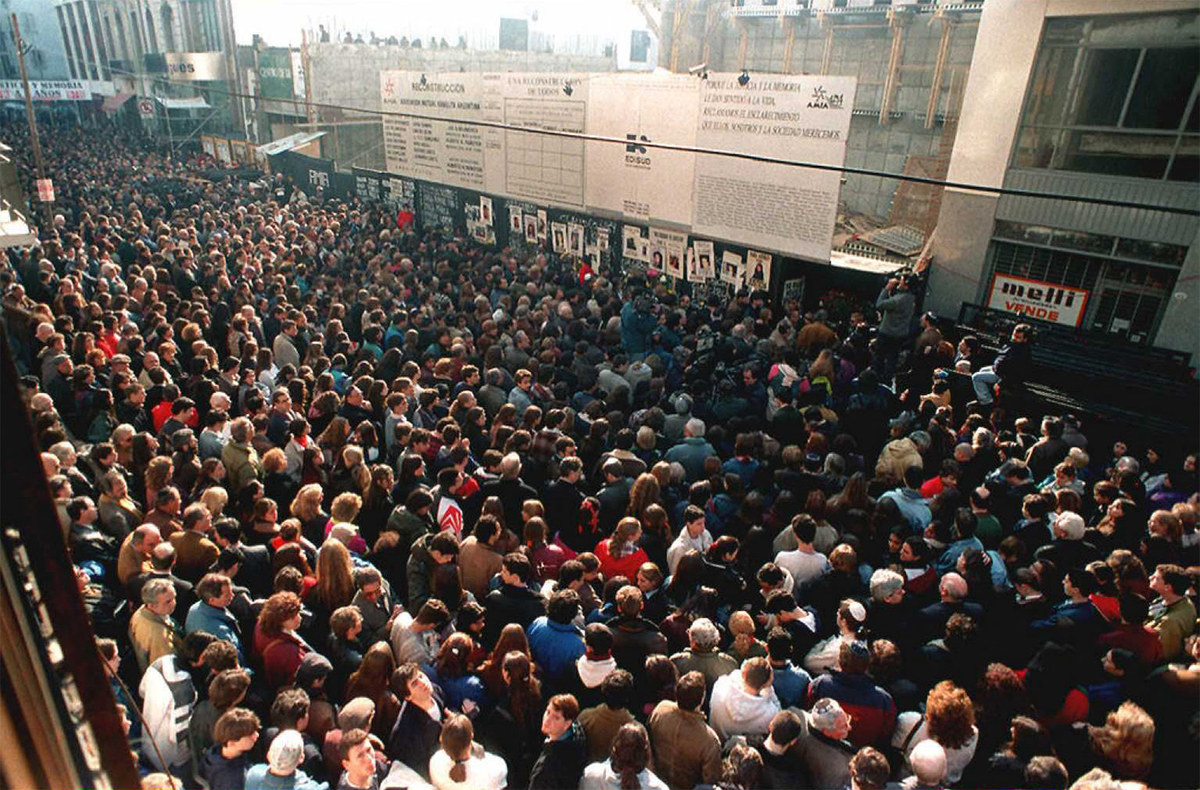
The 1994 assault has never been claimed or solved, but Argentina and Israel have long suspected the Iran-backed group Hezbollah carried it out at Iran’s request.
Prosecutors have charged top Iranian officials with ordering the attack, though Tehran has denied any involvement.
The court also implicated Hezbollah and called the attack against the AMIA — the deadliest in Argentina’s history — a “crime against humanity.”
Tuesday’s statement from the foreign ministry said: “Argentina seeks the international arrest of those responsible for the AMIA attack of 1994, which killed 85 people, and who remain in their positions with total impunity.”
“One of them is Ahmad Vahidi, sought by Argentine justice as one of those responsible for the attack against AMIA,” said the statement, which was co-signed by the security ministry.
Argentina has the largest Jewish community in Latin America, with some 300,000 members. It is also home to immigrant communities from the Middle East — from Syria and Lebanon in particular.
US Senate approves $95 billion aid bill to support Ukraine, Israel war effort

- Ukraine, who has been been on the back foot in its war against Russia, welcomed the vote
- Israel, which has killed more than 34,000 in Gaza, plans to attack Rafah to free hostages held by Hamas
WASHINGTON: A sweeping foreign aid package easily passed the US Congress late on Tuesday after months of delay, clearing the way for fresh Ukraine funding amid advances from Russia’s invasion force and Kyiv’s shortages of military supplies.
The Senate approved by 79 to 18 four bills passed by the House of Representatives on Saturday, after House Republican leaders abruptly switched course last week and allowed a vote on the $95 billion in mostly military aid for Ukraine, Israel and Taiwan and US partners in the Indo-Pacific.
The four bills were combined into one package in the Senate.

The largest provides $61 billion in critically needed funding for Ukraine; a second provides $26 billion for Israel and humanitarian aid for civilians in conflict zones around the world, and a third mandates $8.12 billion to “counter communist China” in the Indo-Pacific.
A fourth, which the House added to the package last week, includes a potential ban on the Chinese-controlled social media app TikTok, measures for the transfer of seized Russian assets to Ukraine and new sanctions on Iran.
Biden has promised to sign the measure into law as soon as it reaches his desk, and his administration is already preparing a $1 billion military aid package for Ukraine, the first to be sourced from the bill, two US officials told Reuters.
The Senate’s Democratic and Republican leaders predicted that Congress had turned the corner in putting Russian President Vladimir Putin and other foreign adversaries on notice that Washington will continue supporting Ukraine and other foreign partners.
“This is an inflection point in history. Western democracy perhaps faced its greatest threat since the end of the Cold War,” Democratic Majority Leader Chuck Schumer said in the Senate.
The aid package could be the last approved for Ukraine until after elections in November when the White House, House of Representatives and one-third of the Senate are up for grabs.
Much of the opposition to the security assistance in both the House and Senate has come from Republicans with close ties to former US President Donald Trump, a Ukraine aid skeptic who has stressed “America First” policies as he seeks a second term.
Senate Republican Leader Mitch McConnell, a strong advocate for assisting Ukraine, expressed regret about the delay, largely due to hard-line Republicans’ objections to adding more to the $113 billion Washington had authorized for Kyiv since Russia began its full-scale invasion in February 2022.
“I think we’ve turned the corner on the isolationist movement,” McConnell told a news conference.
Some of the Ukraine money — $10 billion in economic support — comes in the form of a loan, which Trump had suggested. But the bill lets the president forgive the loan starting in 2026.
HUMANITARIAN CONCERNS
The influx of weapons should improve Kyiv’s chances of averting a major breakthrough in the east by Russian invaders, although it would have been more helpful if the aid had come closer to when Biden requested it last year, analysts said.
It was not immediately clear how the money for Israel would affect the conflict in Gaza. Israel already receives billions of dollars in annual US security assistance, but it more recently has faced its first direct aerial attack by Iran.
Aid supporters hope the humanitarian assistance will help Palestinians in Gaza, which has been devastated by Israel’s campaign against Hamas to retaliate for Oct. 7 attacks that killed 1,200 people.
Gaza health authorities say the campaign has led to the deaths of more than 34,000 civilians in the Palestinian enclave.
It was the second time this year that the Democratic-led Senate passed security aid for Ukraine, Israel and the Indo-Pacific. The last bill, more than two months ago, garnered 70 percent support in the 100-member chamber from Republicans and Democrats. But leaders of the Republican-controlled House would not allow a vote on the foreign aid until last week.
The legislation’s progress has been closely watched by industry, with US defense firms up for major contracts to supply equipment for Ukraine and other US partners.
Experts expect the supplemental spending to boost the order backlog of RTX Corp. along with other major companies that receive government contracts, such as Lockheed Martin , General Dynamics and Northrop Grumman.
The House passed the Ukraine funding by 311-112, with all “no” votes coming from Republicans, many of whom were bitterly opposed to further assistance for Kyiv. Only 101 Republicans voted for it, forcing Speaker Mike Johnson to rely on Democratic support and prompting calls for his ouster as House leader.
However, the House left Washington for a week-long recess, without triggering a vote to remove Johnson.







